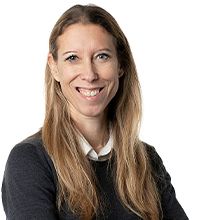Researcher at Copenhagen Business School on students’ well-being: »We must not avoid discomfort. We must learn to talk about it«

Students at Copenhagen Business School (CBS) experience increasing stress and pressure. The problem is not unique to CBS, but it reflects a general tendency among students (in Danish only). Pernille Steen Pedersen, Assistant Professor at the Department of Business Humanities and Law at CBS, has initiated a research project that aims to prevent stress and generate well-being among the students at CBS.
The project, which has now been running for nearly three years, was originally established with the primary aim of understanding the increasing dissatisfaction among students.
According to Pernille Steen Pedersen, there are complex dynamics at play, which require a more profound understanding before possible solutions can be identified. Among other things, her study reveals that the continuous assessment that students experience constitutes a significant source of stress.
“This is not a new phenomenon, but it is becoming increasingly pronounced concurrently with our society’s increasing focus on performance. Today, there are infinite ways of measuring and assessing yourself against others – both in terms of evaluations and assessments during their studies, but also by way of social media,” says Pernille Steen Pedersen.
Communities feel like a threat
To expose one’s challenges and insecurities can be a transgressive experience for many students. This is why communities are now considered as potential threats, where the students come face to face with their own vulnerabilities and insecurities
Pernille Steen Pedersen, Assistant Professor
Pernille Steen Pedersen’s research sheds light on a critical change in the study environment, where the fear of asking stupid questions or giving wrong answers is keeping many students from actively participating in the teaching. 85 per cent of the respondents do not raise their hand in class from fear of saying something that is a wrong.
In her qualitative interviews, a similar picture emerged in relation to study groups and group work. It has now become more common for more students to prefer to work alone rather than in groups. This tendency, Pernille Steen Pedersen explains, is a natural consequence of the challenging nature of group work, where it is difficult to hide a lack of understanding.
“To expose one’s challenges and insecurities can be a transgressive experience for many students. This is why communities are now considered as potential threats, where the students come face to face with their own vulnerabilities and insecurities,” Pernille Steen Pedersen elaborates.
Shame pays a part in the stress young people’s experience
Pernille Steen Pedersen originally began her research focusing on work-related stress, but she quickly realised that similar dynamics were at play among her students.
Among other things, her research showed that stress is often related to shame, which is also true of the student environment.
'“Anxiety about being cast out and the fear of being revealed to be inadequate are merely some of the aspects that feed om shame. Young people carry the burden of constant evaluations from the surrounding world, which enhances the feeling of inadequacy. They struggle with comparisons, which generates a vicious circle of envy and jealousy, which is inextricably tied to shame,” Pernille Steen Pedersen explains.
And it is exactly the feeling of shame that will make students withdraw from communities and hide their insecurities, which then results in a distancing or exclusion from their community, which may eventually result in loneliness.
“Don’t tell us to just relax”
We often hear that we should just relax and not read too much into our grades. But that is not the reality I live as a student, where demands to continuously perform are ever present and where performing well is awarded
Amanda Ngoc Nguyén Madsen, Student at CBS
21-year-old Amanda Ngoc Nguyén Madsen studies Business Economics and Project Management at CBS, and she is one of the students who struggle with the programme’s expected performance level. According to her, it is primarily due to the pressure from the surrounding society and the study culture put on young students to perform well on every level.
’We feel like we have to be flawless, not only in terms of our studies, but also in our social lives and careers. This culture of high demands creates a constant feeling of not living up to the standards,” Amanda Ngoc Nguyén Madsen explains. She then points to the fact that well-meaning advice about not caring about one’s grades or what other people think has no effect.
“We often hear that we should just relax and not read too much into our grades. But that is not the reality I live as a student, where demands to continuously perform are ever present and where performing well is awarded.”
By way of example, at CBS, it is common for consultancy companies like McKinsey to invite the students with the highest grades to dinner with the purpose of offering them jobs.
And even though Amanda is doing well at university, she also finds it hard to raise her hand or share her insecurities with others.
“Sometimes, I feel a sense of shame, when I am not able to live up to my own high expectations. It is as if we only focus on what we feel we should be doing and achieving, which may then lead to us not sharing our experiences with each other.
The art of creating well-being in communities
In order to address some of these challenges, Pernille Steen Pedersen believes that the young students should develop new skills that will enable them to join communities. This includes, among other things, the ability to handle other people’s criticism, to cope with other people’s problems and to dare talk about one’s own feelings.
With her research, Pernille Steen Pedersen wishes to focus on how stress handling can go from being an individual problem to a common concern. Among other things, she has developed tools that can change the way students talk to each other, and she would like to further develop teaching materials that will strengthen the students’ skills in terms of generating communities of well-being at their educational institutions.
Furthermore, she is looking into the possibility of including artistic methods in this work. She is, for example, establishing a research project in collaboration with The Betty Nansen Theatre and The Danish Chamber Orchestra as well as eight Upper Secondary Schools, where she will combine the knowledge on student well-being already available with the practices of the theatre and the orchestra. Specifically, she wants to develop and try out innovative methods and teaching materials that will teach the students to listen, decode, collaborate and fail based on methods that are central to artistic practices.
“There is great potential in integrating broader artistic practices in methods and teaching materials as part of an important step in the direction of understanding and countering the increasing dissatisfaction among young students, and it has the potential to create positive change in the educational system. Focusing on strengthening the students’ social and emotional skills, we can hopefully look into a future where well-being and learning walk hand in hand, and where students become even better prepared for the labour market,” Pernille Steen Pedersen concludes.
Contact: Martine Mengers, journalist, CBS (mm.slk@cbs.dk)
